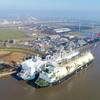Florida Port Regs Aim To Stop Drugs
Florida has been a favored destination for South American drug cartels since the heyday of Colombia's "cocaine cowboys" in the 1970s and 1980s. The cartels set up sophisticated distribution networks to ferry cocaine and marijuana arriving at Miami's air and sea ports to the rest of the United States. Between 1991 and 1998, 34 percent of U.S. illegal drug seizures took place in Florida, compared with 45 percent for the Southwestern border states, according to a report that the U.S. Office of National Drug Control Policy issued in December. Nationwide, 34 percent of seizures were carried out on commercial ships. Another 16 percent took place on noncommercial vessels.
"Heretofore, it was relatively easy to get things in through the seaports," said Jim McDonough, director of the governor's Office of Drug Control. "That's what traffickers tell us. That's what a review of the seaports gave an indication of two years ago." Along with tightening port security, "we're working the airports, the roadways and the Miami River," McDonough said. Under the provisions of the bill that the legislature passed before adjourning on Friday, seaports will be given funds to secure their perimeters, enhance lighting and screen employees more effectively. The bill also sets up background checks for employees and prohibits many felons convicted of robbery or drug-related crimes from working on the docks.
Ports, however, could continue to employ current workers or waive the restrictions for new employees if they felt there was justification. The bill, which Bush is expected to sign in the next few weeks, is the culmination of more than two years of work among port officials and state and federal law-enforcement agencies. For the fiscal year that begins on July 1, state lawmakers appropriated $7 million for the program. Of that, $1.5 million will be used to set up background checks at the major deep-sea ports. The remaining $5.5 million will help pay for such infrastructure needs as fencing, lighting and surveillance cameras.
Port officials had identified nearly $50 million in desired security enhancements, a wish list pared by state law enforcement and drug officials to $34 million, said Mike Rubin, vice president of the Florida Ports Council, an organization representing Florida's 14 seaports from Key West to Pensacola. "What this allows us to do is at least start the background check process, and it gives us $5.5 million to do some stuff," Rubin said. "We'll look at what ports need the money right now and what can we do with $5.5 million." - (Reuters)











